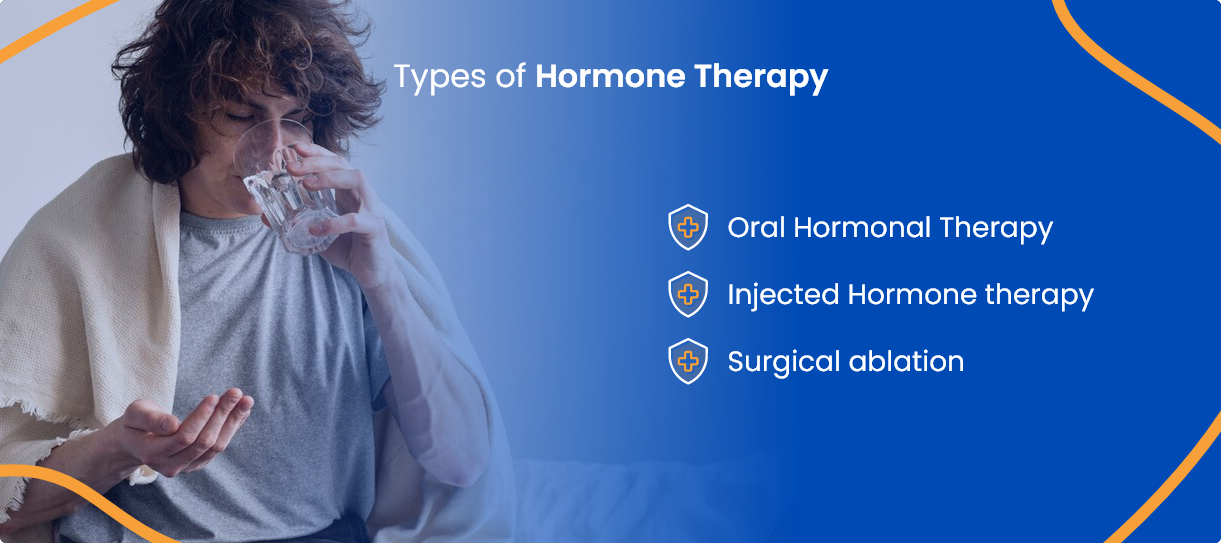
Book a Consultation
Thank you!
Your form has been sent successfully.

Hormone therapy (also called endocrine therapy) treats certain cancers by slowing or stopping their growth. It does this by blocking hormones or removing hormone-producing organs, treating the whole body rather than just one spot.
Doctors recommend it when a cancer uses your body's hormones to grow. This therapy can:
Your hormone therapy might involve pills you take at home, shots given at a clinic, or surgery to remove hormone-making organs.
Hormone therapy comes in three main types, each given in different ways:

Your doctor chooses the type based on your specific cancer and overall care plan.
Sometimes oncologists recommend surgery in certain cancers to remove the organs that generate hormones.
For example, to treat breast cancer, the ovaries may be removed to stop estrogen production (ovarian ablation). Testicles may be removed to decrease testosterone levels to treat prostate cancer (bilateral orchiectomy). The surgery is done by a specialist surgeon at a hospital.
Several cancers can be treated using hormone therapy, with methods tailored to the type of cancer and treatment goal.
Doctors may recommend the treatment to people with the following types:
Blocks female hormones (estrogen and progesterone) to slow tumor growth.
Reduces male hormones (androgens) to manage disease progression.
Uses hormone tablets after surgery to replace hormones and suppress growth.
Medicines help control excess hormones and slow cancer growth.
May use hormone replacement or hormone-directed treatments depending on your needs
Your specific cancer type determines timing and the exact hormone therapy plan.
Hormones are chemical messengers that regulate critical biological functions, including growth, development, and reproduction. Hormone therapy for cancer treatment modifies hormone levels and functions, which can lead to various side effects.
These side effects vary depending on the type and stage of cancer, as well as the specific hormone therapy type and dosage. Your hormone therapy may begin before, during, or after other treatments based on your cancer type and overall treatment strategy.
Throughout hormone therapy, regular checkups and medical tests will enable your care team to closely monitor your response. It's important to immediately notify your health care team if new symptoms emerge or existing ones worsen, as this will help them manage your care effectively.
Common side effects of hormone therapy include:

Hot flashes and night sweat

Weight gain

Fragile bones (Osteoporosis)

Mood changes

Fatigue

Low sexual drive

Vagina dryness, itching, and irritation

Altered memory

Infertility
While some side effects resolve after treatment ends, others may persist for a prolonged period. Your ACTC care team is dedicated to closely monitoring and managing these side effects during your ongoing follow-up care, including regular physical exams and medical tests to support your overall well-being.
Hormone therapy can cause side effects that vary by cancer, therapy type, and dosage. It is essential to work with your healthcare team to manage these side effects during and after treatment to maintain your safety, well-being, and quality of life.
Side effects may decrease after treatment ends, but some effects, like fertility changes or bone thinning, can last longer. Early communication with your healthcare team is key to managing hormone therapy side effects.
Practical steps include:
Your team is dedicated to helping maintain your quality of life throughout treatment.
Clear communication with your care team can greatly enhance your understanding and experience of hormone therapy. Consider asking these questions:

Which type of hormone therapy will I receive, and why now?

How exactly does this hormone therapy work?

Will my hormone therapy happen before, during, or after other cancer treatments?

How long will my hormone therapy last, and will the dosage change over time?

What possible side effects should I immediately report?

Could hormone therapy impact my fertility, and should I consult a fertility specialist before starting?

Will hormone therapy affect my sex life, and if so, for how long?

Can hormone therapy affect my ability to work, exercise, or manage daily activities?

Who do I contact if I experience side effects or have concerns during regular hours?

Who should I contact for questions or concerns after regular hours?

How will we determine if the hormone therapy is working effectively?

Will I require any scans or medical tests during or after treatment?
Also, find out who you should contact for questions or concerns after hours, and ask about follow-up scans and tests.
At ACTC, you’re never navigating cancer alone. Our multidisciplinary team works closely with you and your loved ones to create a treatment plan backed by research—and grounded in compassion.
You’ll meet with:

MD, Hematology & Oncology

MD, Ph.D., Hematology/ Medical Oncology

MD, Radiation Oncologist
We tailor each plan to your needs, your life, and your goals.

 352-345-4565
352-345-4565
Schedule a consultation by calling
 352-345-4565
352-345-4565